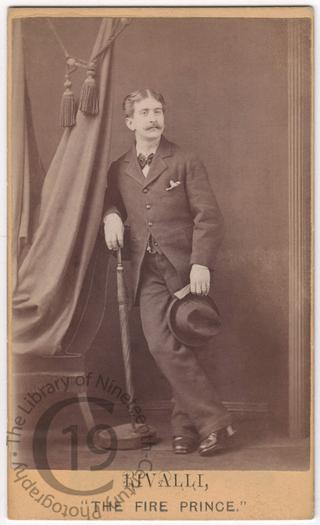
Rivalli, The Fire Prince
A carte-de-visite portrait of ‘Rivalli, the Fire Prince,’ who was born John Watkins in or about 1853 in the Mile End Road area of London’s East End.
Advertisements in the classified columns of British newspapers attest to a long career. One of the earliest reads: ‘Fire! Fire!! Fire!!! Eugene Rivalli, The Great Brazilian Fire Prince, from the Cirque Napoleon, Paris, in his Marvellous Fire Cage, & c., now performing in the Cirque Royal, Cremorne, Gardens, London, Every Night, at 11.30’ (The Era, 18 July 1869).
This ‘fire cage’ clearly proved an enduring attraction. Nearly thirty years later, when he was appearing at the Royal York Palace of Varieties in Southampton, an advertisement touted him as ‘The Human Salamander. The Fire Prince. See Rivalli Walking on Red Hot Irons, Drinking Boiling Oil, Standing in a Cage of Fire. Rivalli has appeared before Her Most Gracious Majesty Queen Victoria’ (Southern Echo, 7 February 1896). If the Queen had ever seen him perform, she was not impressed enough the mention the experience in her journals.
He was still appearing regularly in London and the provinces as late as 1899. ‘A grand spectacle will be produced at Olympia on Dec. 24. One of the items will be a forest or prairie on fire, for which Rivalli, the fire prince, has been engaged’ (The Era, 18 November 1899).
According to no less a source than the great Houdini, the Fire Prince died the following year. ‘One of the more recent fireproofs was Eugene Rivalli, whose act included, besides the usual effects, a cage of fire in which he stood completely surrounded by flames. Rivalli, whose right name was John Watkins, died in 1900, in England. He had appeared in Great Britain and Ireland as well as on the Continent during the later years of the 19th century’ (Miracle Mongers and Their Methods: A Complete Exposé of the Modus Operandi of Fire Eaters, Venomous Reptile Defiers, Sword Swallowers, Human Ostriches, Strong Men, Etc., New York, 1920).
The following obituary appeared in The Era (24 February 1900):
‘The news comes from Berlin of the death of Eugene Rivalli, “the fire prince,” who was known in private life as John Watkins. He had fulfilled engagements at the Westminster Aquarium and some of the principal circus establishments in London and the provinces, but was of late years better known on the continent. His feats were performed by the aid of science and pluck, and he so prepared his body with chemicals that, for a time at least, he could defy even the most intense heat. Mr Rivalli was often taken for a foreigner, but was a Cockney to the core, having been born off the Mile End-road. He had no sort of professional connections, his father occupying a position in the industry connected with shipbuilding. In Rivalli’s early youth the family moved to Liverpool, where the lad was soon left an orphan. A relative procured him a situation with a licensed victualler in a large way of business, and this was the calling that the deceased followed in Liverpool, then in London, then in Liverpool again for several years. But from his earliest boyhood the Fire Prince had a fancy for experimental chemistry, and especially in relation to fire. The pranks he played were not always appreciated by the people among whom he lived. Mr Rivalli’s introduction to professional life came about in this way. He was engaged at a bar in Liverpool that was a great resort of circus folk, minstrels, and music hall singers – notably Joe Bibb, Unsworth and Eugene, and Alfred Vance – and their conversation fired his ambition to appear in public. […] He at length triumphed over his difficulties, and fulfilled, upwards of a quarter of a century since, an engagement at Cremorne, […] there was hardly a city of Europe that the Fire Prince had not visited over and over again, earning occasionally enormous fees. A love of speculation in every form of entertainment swallowed up a fortune laboriously earned, and Rivalli had to go back to his red-hot ploughshares and boiling oil. At length he became a sagacious salamander, and saved his money.’
The following month the same journal informed its readers: ‘Mrs Watkins, the widow of the late Eugene Rivalli, the fire prince, asks us to state that the death of her husband will not interfere in any way with her carrying on the Norton Hotel, 39, Norton-street, Liverpool’ (The Era, 24 March 1900). When the 1901 census was taken the following year, widow Sarah Ann Watkins was still at this address, a 49-year-old ‘Boarding House Keeper’ living with her daughters Emily (29) and Eugenie (13).
Photographed by Augustus Frederick Vogel of Liverpool.
Code: 127092




